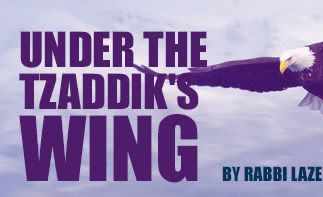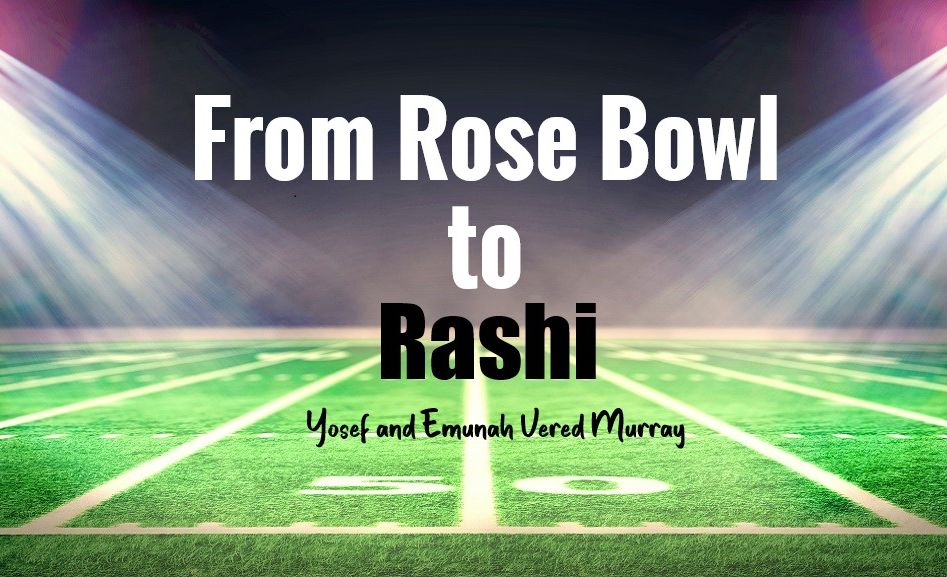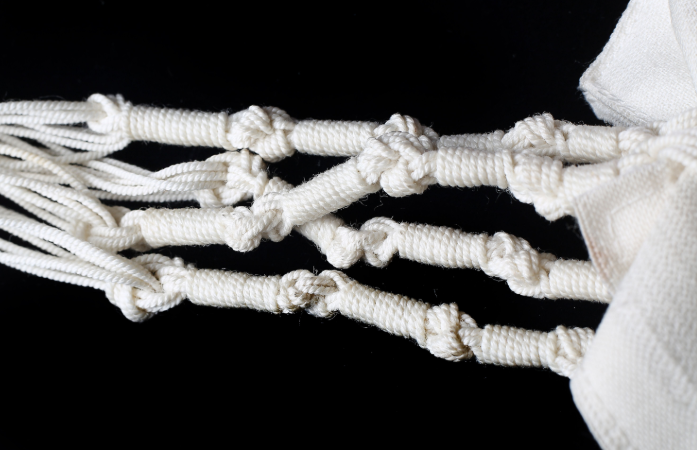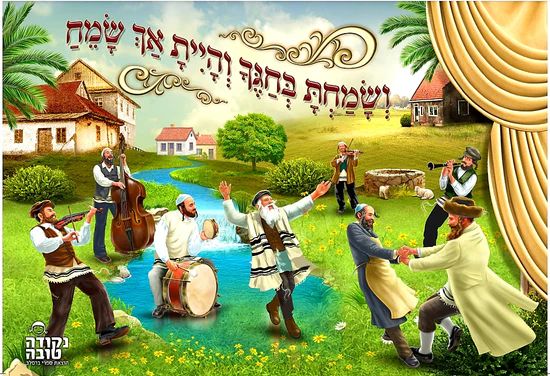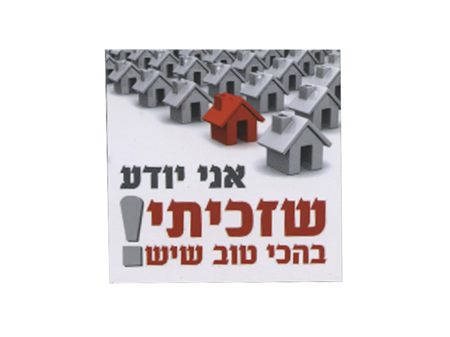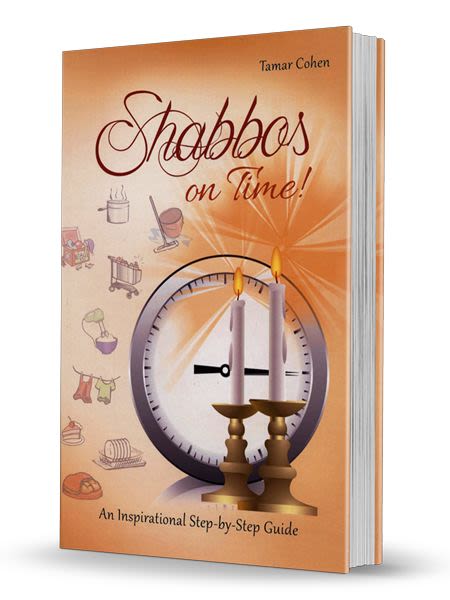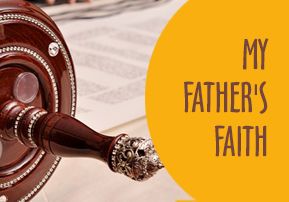
My Father’s Faith
After the death of my grandfather, there was a slow decline in the family's religious observance. All the brothers became businessmen and eventually chose secular lifestyles...

When I was fifteen, my father changed his life. He picked up the religion he had willfully discarded as an ambitious young man in his twenties. He was raised in Brooklyn, the youngest of seven children born to Orthodox Lithuanian immigrants.
They were very poor. My father Mordecai and his older brother Moishy were blessed with beautiful voices and earned money by singing at weddings. “Three o’clock in the morning we used to come home on the subway,” my Dad would reminisce, marveling at the fact of two little boys traveling alone at night in New York. He was seven years old at the time.
The money they made was handed directly to their mother, who would give back a quarter to each.
Harder times were yet to come. My father watched his father drop dead from sudden heart failure while standing in prayer at the synagogue. This must have been an enormous crisis of faith for him. Not only did he see my grandfather struck down while praying but apparently they had argued earlier in the day.
My grandfather, a hard-working and humble man, served as the shamash (maintenance man) of the synagogue. A member of the congregation criticized something he had done, and my father lashed out at the man who had spoken so harshly. My grandfather immediately reprimanded my father for being disrespectful to an elder. Hurt and insulted, my father refused to apologize and turned away from my 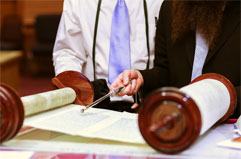 grandfather. They had not yet reconciled when my grandfather collapsed and died. My father was sick with regret and it haunted him for years.
grandfather. They had not yet reconciled when my grandfather collapsed and died. My father was sick with regret and it haunted him for years.
I heard this story from my mother, in lowered tones. I understood that it was a taboo topic, forever forbidden to acknowledge or discuss. I thought maybe this was the reason my father was often morose but now I know that it was also due to his subsequent estrangement from God.
Following the death of my grandfather, there was a slow decline of the family’s religious observance. All the brothers became businessmen and eventually chose secular lifestyles. My father graduated from college and married my mother, who came from a non-religious home. His two sisters married men who were not at all observant. It must have been hard for my grandmother Esther, of whom I have very little memory. She spoke only Yiddish and suffered from dementia. But according to my mother, she remained religious all her life.
When my father turned forty, his mother passed away. He traveled back to Brooklyn and spent the week of mourning with his siblings. He later said that when he looked around the room he realized that not one remaining relative was living a Torah life, including himself. That was the moment he decided to honor his parents and return to God.
A few days later, I came home from school and saw my mother standing in the kitchen, surrounded by brand new pots and pans. “Your father decided we should keep kosher!” she announced. I could see she was thrilled with all her new cutlery and appliances.
My reaction? I shrugged and went to my room. It meant very little to me. The following Friday night my mother lit Shabbat candles for the first time. She then carefully set the table and tried to convince me to stay for dinner, which she had worked on for two days. But I had a date to go dancing. Dinner with the folks and my two younger siblings? Maybe another time…
My older brother had a similar reaction. He hopped on his motorcycle and sped off to meet friends. There were now two sides to the family, with my mother standing in the middle. She just wanted everyone to be happy.
The next week my father enrolled the two younger kids in Jewish day schools. He also joined a synagogue and walked there every Shabbat. It took him over an hour each way.
I didn’t like what was going on. It was the sixties, the legendary “Age of Aquarius”. I thought everyone should throw away any and all distinctions and boundaries that kept humanity from being “one.” None of my friends were religious although we considered ourselves spiritual. Acting Jewish just seemed old-fashioned and very un-cool.
Yet I couldn’t deny the change I saw in my father. For the first time in my memory, he seemed genuinely content. He felt close to his new rabbi and friends at the synagogue. He loved the elaborate Shabbat meals my mother carefully prepared. He sang Shabbat songs I had never heard before and his voice was really beautiful. He began learning Torah and Hebrew books appeared on our bookshelves.
My mother seemed happier too, although she missed watching TV on Shabbat. She didn’t have any real interest in becoming religious but it made my father happy. So she joined the local sisterhood and paid close attention to the kosher symbols on all food products.
My father tried desperately to reel me in. But the problem was this: he had never explained to me why he decided to make this change in his life. Perhaps if he had shared his feelings, I might have been able to see beyond what felt like another of his plans to improve me. As a little girl I had been made to play the violin (which I hated), the clarinet (which I hated), and attend classical music concerts (which were boring). He wanted me to major in history (which I could never remember) and he could not understand why I had such difficulties in math and science (he was a renowned chemist for the FDA). I was never what he wanted me to be and now he wanted me to be religious. I was finished with trying to please him.
In the meantime I was busy studying psychology, demonstrating against the Vietnam War and working on the committee to impeach President Nixon. I volunteered at a hot-line clinic, wrote poetry and studied transcendental meditation. I was all over the place and I was nowhere. As the saying goes, “If you don’t know where you’re going, any road will get you there.“
One day my father ventured into my room. I was organizing a bunch of bumper stickers to give out at a rally that night. The stickers said “Legalize Marijuana”. My father watched me quietly for a minute and then in a strained voice said, “This is your cause? This is what you’re concerned about?” I didn’t answer because the truth was I could not have cared less about legalizing pot. It was just one more thing on the political agenda of the day.
The next evening he asked me to join him in a protest rally against the Soviet Union and I agreed to go. In those days Jews were forbidden to leave Russia and were jailed if they were caught trying. I was very moved by that demonstration. It was exciting to be among so many Jews, many my own age and proud to be Jewish. It seemed like such an important and noble cause and I had a real feeling of belonging. Even my older brother got involved. He went on to join the JDL and teach basic self-defense.
Eventually, to my father’s great joy, my brother and I accepted his offer to go study Torah in Israel and both of us became observant, got married, and had children of our own. My father lived long enough to take great pleasure in his grandchildren and the way they were being raised. With them he was relaxed and affectionate, completely different from the way he had been with his own kids. I believe it was because he was at peace with himself.
When my father was fifteen, his father died. When I was fifteen, my father was born.


